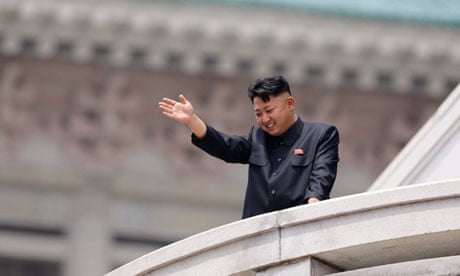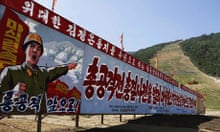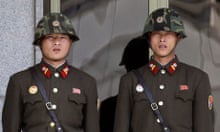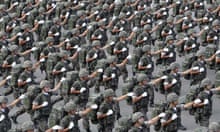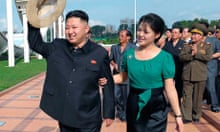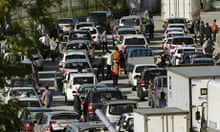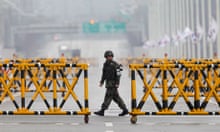North Korean scientists are thought to have attained the ability to build uranium-based nuclear bombs on their own, cutting the need for imports that had been one of the few ways outsiders could monitor the country's secretive atomic work.
According to evidence gathered by two North American experts, material published in North Korean scientific publications and news media shows that Pyongyang is mastering domestic production of essential components for the gas centrifuges needed to make such bombs.
The development further complicates long-stalled efforts to stop a nuclear bomb programme that Pyongyang has vowed to expand, despite international condemnation.
If Pyongyang can make crucial centrifuge parts at home, outsiders cannot track sensitive imports, which could spell the end of policies based on export controls, sanctions and interdiction that have been the centrepiece of international efforts to stop North Korea's nuclear programme over the last decade, Joshua Pollack, a Washington-based expert on nuclear proliferation, said.
"If they're not importing these goods in the first place, then we can't catch them in the act," said Pollack, who gathered the evidence with Scott Kemp, an expert on centrifuge technology at the Massachusetts Institute of Technology. "We won't necessarily see anything more than what the North Koreans want us to see."
The state of North Korea's nuclear programme is of vital concern to Washington because Pyongyang wants to build an arsenal of nuclear-armed missiles that can reach American shores.
The North has conducted three nuclear tests of apparently increasing power since 2006, most recently in February, and it is believed to have a handful of crude plutonium-based bombs. Many experts estimate, however, that Pyongyang has not yet mastered the miniaturisation technology needed to mount a warhead on a long-range missile.
Fuel for North Korea's plutonium bombs has been made in a reactor that is large and easily monitored. But uranium-based weapons are more difficult for outsiders to investigate because the centrifuges needed to enrich uranium for bombs can be easily hidden from satellites and prying inspectors.
The UUS and others long suspected North Korea was clandestinely developing a uranium programme, despite denials from Pyongyang. US officials confronted North Korea in 2002 with claims its scientists were pursuing uranium enrichment, sparking a nuclear crisis. In a reversal, visiting Americans were shown in November 2010 what they called a sophisticated, modern uranium enrichment facility with 2,000 centrifuges at the North's main nuclear facility.
Restrictions on imports to North Korea are tightening thanks to China, which is a key ally of Pyongyang but also has been pressing it to give up nuclear weapons. A notice posted on the commerce ministry's website on Tuesday listed 236 pages of items and technologies banned from export to North Korea because of their potential use in manufacturing weapons of mass destruction.
International sanctions banning nuclear weapons-related shipments to North Korea did not stop its progress even when it relied on imported equipment, but the US enjoyed some success tracking the parts allegedly used in the programme. In 2007, for instance, the then US nuclear envoy, Christopher Hill, said Washington had evidence that Pyongyang had bought equipment used only for uranium enrichment.
News media reports and unclassified government documents showed North Korea imported large amounts of centrifuge parts in the early 2000s, Pollack said, but an apparent dearth of observed imports since then suggests that Pyongyang is making the necessary components at home. He said the knowhow for domestic production of key parts appears to have been in place no later than 2009.
Pollack said he and Kemp found "strong and clear" evidence in state media photographs taken inside North Korean factories of specialised lathes that produce the strong metal cylinders needed for centrifuges.
He also spoke of accounts in North Korean propaganda and technical journals of iron and steelmaking consistent with the production of an extremely hard steel alloy that can resist high rotational speeds in centrifuges, although the final step of the process was not described.
Pollack said their research also found scientific reports and patent awards describing work on technologies for crucial centrifuge parts. Those include vacuum pumps that remove air from centrifuges and pipes before uranium-bearing gas is added and electronic devices that control the speed of the electric motor in the base of each centrifuge.
North Korea's nuclear programme is cloaked in secrecy and treated domestically as a national treasure. The small, impoverished country says it must defend itself from US attempts to overthrow its political system.
It is not clear whether North Korea has made bomb-grade uranium, and Pyongyang says the programme is for peaceful, energy-generating purposes. But analysts strongly suspect that, even beyond the facility Americans toured in 2010, Pyongyang has other uranium enrichment facilities that could be producing large amounts of weapons-grade material.
Earlier this year, during a barrage of threats aimed at Washington and Seoul, Pyongyang vowed to resume all its nuclear fuel production. Recent satellite imagery appears to show that North Korea was restarting its plutonium reactor.
